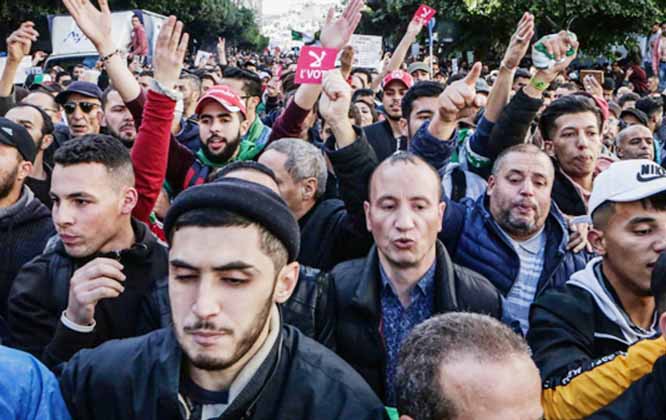
AFP, Algiers :
A record six in 10 Algerians abstained from voting in the country’s presidential election that was firmly rejected by the nine-month-old protest movement.
Just under 40 percent of registered voters cast a ballot on Thursday, said electoral authority chief Mohamed Charfi, speaking on national television.
Charfi said the turnout among Algerians living in the country was a little over 41 percent and close to nine percent among its nationals living abroad, the lowest rate for a multi-party election in the country’s history.
The unpopular vote comes after a street protest movement in April ousted president Abdelaziz Bouteflika, 82, following two decades in office.
Demonstrators have kept up weekly protests demanding an end to the military-backed political system.
On Thursday, tens of thousands rallied in central Algiers, where all morning police with water cannon and helicopters tried to disperse protesters and prevent a repeat of the previous day’s anti-election demonstrations.
Given the broad opposition, the five candidates have run low-key campaigns, usually under heavy police protection and often being drowned out by hecklers.
All of them in the past either supported Bouteflika or participated in his government-two as prime ministers and one as a minister.
This week saw Algerian courts hand down heavy jail sentences in high-profile corruption trials for two other former prime ministers, Ahmed Ouyahia and Abdelmalek Sellal.
Since then protesters have stayed on the streets for more than 40 weeks, demanding the total dismantling of the system that has ruled Algeria since independence from France in 1962.
The military high command, which long wielded power from the shadows, has been forced to take a more visible role and has pushed for the election as a way to resolve the political crisis.
Demonstrators have also directed their ire at the powerful army chief Ahmed Gaid Salah, who has emerged as Algeria’s de facto strongman.
A previous poll set for July was scrapped for lack of viable candidates and interim president Abdelkader Bensalah’s term technically ended five months ago.
But even those verdicts did little to win over the protesters, who see the trials as little more than a high-level purge in a struggle between still-powerful regime insiders.
Protests have been illegal in Algiers since 2001 and police have only tolerated weekly Hirak protests on Fridays and student marches on Tuesdays.
Wednesday marked the anniversary of the outbreak of major demonstrations against French colonial power in Algeria in 1960, and calls online urged protesters to converge on the Algiers square commemorating it.
Meriem, a 62-year-old Algiers resident, marched with her daughter and daughter-in-law brandishing red cards to oppose the election.
“I’m marching to say no to the vote,” she said, “no to the Bouteflika system without Bouteflika.”
A record six in 10 Algerians abstained from voting in the country’s presidential election that was firmly rejected by the nine-month-old protest movement.
Just under 40 percent of registered voters cast a ballot on Thursday, said electoral authority chief Mohamed Charfi, speaking on national television.
Charfi said the turnout among Algerians living in the country was a little over 41 percent and close to nine percent among its nationals living abroad, the lowest rate for a multi-party election in the country’s history.
The unpopular vote comes after a street protest movement in April ousted president Abdelaziz Bouteflika, 82, following two decades in office.
Demonstrators have kept up weekly protests demanding an end to the military-backed political system.
On Thursday, tens of thousands rallied in central Algiers, where all morning police with water cannon and helicopters tried to disperse protesters and prevent a repeat of the previous day’s anti-election demonstrations.
Given the broad opposition, the five candidates have run low-key campaigns, usually under heavy police protection and often being drowned out by hecklers.
All of them in the past either supported Bouteflika or participated in his government-two as prime ministers and one as a minister.
This week saw Algerian courts hand down heavy jail sentences in high-profile corruption trials for two other former prime ministers, Ahmed Ouyahia and Abdelmalek Sellal.
Since then protesters have stayed on the streets for more than 40 weeks, demanding the total dismantling of the system that has ruled Algeria since independence from France in 1962.
The military high command, which long wielded power from the shadows, has been forced to take a more visible role and has pushed for the election as a way to resolve the political crisis.
Demonstrators have also directed their ire at the powerful army chief Ahmed Gaid Salah, who has emerged as Algeria’s de facto strongman.
A previous poll set for July was scrapped for lack of viable candidates and interim president Abdelkader Bensalah’s term technically ended five months ago.
But even those verdicts did little to win over the protesters, who see the trials as little more than a high-level purge in a struggle between still-powerful regime insiders.
Protests have been illegal in Algiers since 2001 and police have only tolerated weekly Hirak protests on Fridays and student marches on Tuesdays.
Wednesday marked the anniversary of the outbreak of major demonstrations against French colonial power in Algeria in 1960, and calls online urged protesters to converge on the Algiers square commemorating it.
Meriem, a 62-year-old Algiers resident, marched with her daughter and daughter-in-law brandishing red cards to oppose the election.
“I’m marching to say no to the vote,” she said, “no to the Bouteflika system without Bouteflika.”

